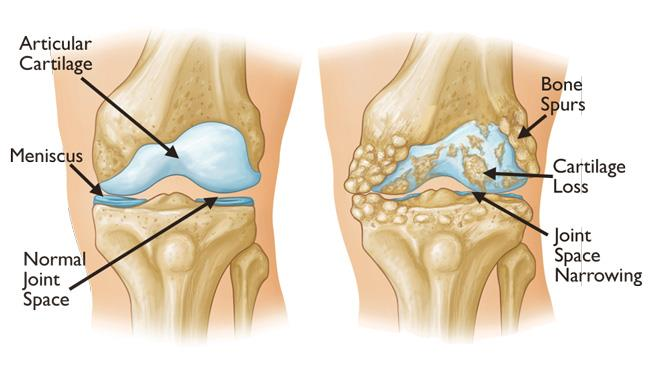A nurse is educating a client who has osteoarthritis of the knee. Which of the following explanations should the nurse give to the client as part of the disease process?
Damage to cartilage and bone can progressively worsen.
Organ failure in later stages may occur without treatment.
Inflammation will resolve over time.
There will be periods of flare-ups and remission of symptoms.
The Correct Answer is A
Choice A reason: Damage to cartilage and bone can progressively worsen. This is a characteristic of osteoarthritis. The disease is a degenerative joint disease that results in the loss of cartilage, which cushions the ends of bones in joints. As the disease progresses, the cartilage becomes thinner and may wear away entirely, causing the bones to rub against each other. This can result in pain, stiffness, and loss of joint movement.
Choice B reason:
Organ failure in later stages may occur without treatment. This statement is not typically associated with osteoarthritis. While osteoarthritis can significantly impact a person's quality of life, it does not directly cause organ failure. However, it's important to manage osteoarthritis effectively to maintain overall health and prevent secondary complications.
Choice C reason:
Inflammation will resolve over time. This is not typically true for osteoarthritis. While some people with osteoarthritis may experience periods of reduced symptoms, the underlying disease process does not resolve over time. In fact, osteoarthritis usually worsens over time.
Choice D reason:
There will be periods of flare-ups and remission of symptoms. This is true for many people with osteoarthritis. Symptoms can vary and may become more severe during periods of activity or stress on the joint. Conversely, symptoms may decrease during periods of rest or with effective management strategies.

Nursing Test Bank
Naxlex Comprehensive Predictor Exams
Related Questions
Correct Answer is A
Explanation
Choice A Reason:
The instruction to urinate a small amount into the toilet before collecting the sample is correct because it helps clear the urethra of organisms that could contaminate the specimen. This initial void helps to flush out bacteria that are present at the opening of the urethra.
Choice B Reason:
This choice is incorrect because urine samples should be kept at body temperature and sent to the lab as soon as possible. Cooling the urine can lead to precipitation of solutes and may affect the results of certain tests.
Choice C Reason:
This statement is incorrect. The proper technique for cleansing prior to urine collection is to wipe from front to back, not back to front. Wiping from back to front can contaminate the urine with bacteria from the anal area.
Choice D Reason:
It is advisable not to collect a urine sample during menstruation unless absolutely necessary because menstrual blood can contaminate the urine specimen, leading to inaccurate test results.
Correct Answer is B
Explanation
Choice A reason:
Asking about the identity of the assailant, while important for legal purposes, does not contribute to the immediate medical care of the client. The priority is to address potential health issues, such as exposure to HIV.
Choice B reason:
The timing of the assault is critical because it determines the eligibility for PEP. PEP should be initiated as soon as possible, ideally within 2 hours, but it can be effective up to 72 hours after exposure. Knowing the exact time of the assault helps healthcare providers act swiftly to mitigate the risk of HIV transmission.
Choice C reason:
While knowing where the assault occurred can provide context and may be relevant for legal proceedings, it does not influence the immediate medical treatment plan for potential HIV exposure.
Choice D reason:
Consent to involve law enforcement is a separate issue from medical treatment. While it's important to respect the client's wishes regarding reporting, it does not impact the decision-making process regarding HIV prophylaxis.
Whether you are a student looking to ace your exams or a practicing nurse seeking to enhance your expertise , our nursing education contents will empower you with the confidence and competence to make a difference in the lives of patients and become a respected leader in the healthcare field.
Visit Naxlex, invest in your future and unlock endless possibilities with our unparalleled nursing education contents today
Report Wrong Answer on the Current Question
Do you disagree with the answer? If yes, what is your expected answer? Explain.
Kindly be descriptive with the issue you are facing.
